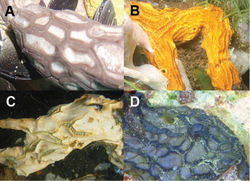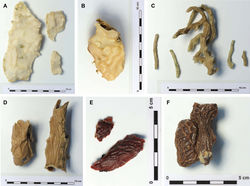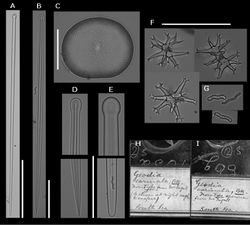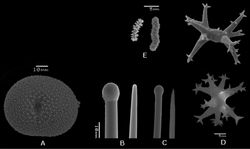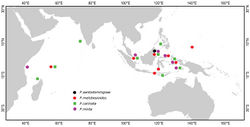Placospongia carinata
| Notice: | This page is derived from the original publication listed below, whose author(s) should always be credited. Further contributors may edit and improve the content of this page and, consequently, need to be credited as well (see page history). Any assessment of factual correctness requires a careful review of the original article as well as of subsequent contributions.
If you are uncertain whether your planned contribution is correct or not, we suggest that you use the associated discussion page instead of editing the page directly. This page should be cited as follows (rationale):
Citation formats to copy and paste
BibTeX: @article{Becking2013ZooKeys298, RIS/ Endnote: TY - JOUR Wikipedia/ Citizendium: <ref name="Becking2013ZooKeys298">{{Citation See also the citation download page at the journal. |
Ordo: Hadromerida
Familia: Placospongiidae
Genus: Placospongia
Name
Placospongia carinata (Bowerbank, 1858) – Wikispecies link – Pensoft Profile
- Geodia carinata Bowerbank, 1858: plate XXV fig. 19.
- Geodia carinata Bowerbank, 1874: plate XLVI figs 1–5.
Material examined
Holotype. “South Sea”: BMNH R1228 - 86g - Bk.1390 (slide), R1275 - PE01 - Bk1390 (slide).
Vosmaer & Vernhout (1902), Siboga expedition: RMNH POR. 755; RMNH POR. 754; RMNH POR. 744. Other material: RMNH POR. 4484, RMNH POR. 3943, RMNH POR. 3944, RMNH POR. 4485, RMNH POR. 3945, RMNH POR. 3946, RMNH POR. 3947, RMNH POR. 3948, RMNH POR. 3949, RMNH POR. 3950; RMNH POR. 3951, RMNH POR. 3952, RMNH POR. 3953, RMNH POR. 3954, RMNH POR. 3955, RMNH POR. 4482, RMNH POR. 3956, RMNH POR. 3957, RMNH POR. 4483, RMNH POR. 3958; ZMA Por. 8813ZMA Por. 09578; ZMA Por. 11367, ZMA Por. 16584, ZMA Por. 10727, ZMA Por. 1818, ZMA Por. 10481, ZMA Por. 20735; ZMA POR.9189. (See Table 2 for full details per specimen)
| registration number | fieldcode | country | province | region | island | locality | habitat | latitude | longitude | depth (m.) | date | collector |
|---|---|---|---|---|---|---|---|---|---|---|---|---|
| RMNH POR. 744 | #1500 | Indonesia | Moluccas | W of Aru | Kur | benthic hard | 20-40 | 6.xii.1899 | Siboga expedition | |||
| RMNH POR. 754 | #1458 | Philippines | Sulu Sea | Ubian islands | anchorage off North Ubian | lithothamnion | 06°7.5'N, 120°26'E | 23 | 28.vi.1899 | Siboga expedition | ||
| RMNH POR. 755 | #1848 | Indonesia | West Papua | Raja Ampat | Misool | sand, stones | 02°28'.5S, 131°3'.3E | 32 | 20.viii.1899 | Siboga expedition | ||
| RMNH POR. 3943 | #KKB/mol716 | Indonesia | East Kalimantan | Berau | Kakaban | Kakaban lake | marine lake | 02°08'57.3"N, 118°31'26.4"E | 0-2 | ix.2008 | L.E.Becking | |
| RMNH POR. 3944 | #KKB/mol754 | Indonesia | East Kalimantan | Berau | Kakaban | Kakaban lake | marine lake | 02°08'57.3"N, 118°31'26.4"E | 0-2 | ix.2008 | L.E.Becking | |
| RMNH POR. 3945 | #KKB/mol780 | Indonesia | East Kalimantan | Berau | Kakaban | Kakaban lake | marine lake | 02°08'57.3"N, 118°31'26.4"E | 0-2 | ix.2008 | L.E.Becking | |
| RMNH POR. 3946 | #KKB/mol810 | Indonesia | East Kalimantan | Berau | Kakaban | Kakaban lake | marine lake | 02°08'57.3"N, 118°31'26.4"E | 0-2 | ix.2008 | L.E.Becking | |
| RMNH POR. 3947 | #KKB/mol814 | Indonesia | East Kalimantan | Berau | Kakaban | Kakaban lake | marine lake | 02°08'57.3"N, 118°31'26.4"E | 0-2 | ix.2008 | L.E.Becking | |
| RMNH POR. 3948 | #KKB/mol825 | Indonesia | East Kalimantan | Berau | Kakaban | Kakaban lake | marine lake | 02°08'57.3"N, 118°31'26.4"E | 0-2 | ix.2008 | L.E.Becking | |
| RMNH POR. 3949 | #KKB/mol713 | Indonesia | East Kalimantan | Berau | Kakaban | Kakaban lake | marine lake | 02°08'57.3"N, 118°31'26.4"E | 0-2 | ix.2008 | L.E.Becking | |
| RMNH POR. 3950 | #KKB/mol1068 | Indonesia | East Kalimantan | Berau | Kakaban | Kakaban lake | marine lake | 02°08'57.3"N, 118°31'26.4"E | 0-2 | ix.2008 | L.E.Becking | |
| RMNH POR. 3951 | #MA/mol700 | Indonesia | East Kalimantan | Berau | Maratua | Haji Buang lake | marine lake | 02°12'31.2"N, 118°35'46.8"E | 0-2 | ix.2008 | L.E.Becking | |
| RMNH POR. 3952 | #MA/mol975 | Indonesia | East Kalimantan | Berau | Maratua | Haji Buang lake | marine lake | 02°12'31.2"N, 118°35'46.8"E | 0-2 | ix.2008 | L.E.Becking | |
| RMNH POR. 3953 | #MA/mol947 | Indonesia | East Kalimantan | Berau | Maratua | Haji Buang lake | marine lake | 02°12'31.2"N, 118°35'46.8"E | 0-2 | ix.2008 | L.E.Becking | |
| RMNH POR. 3954 | #MA/mol1055 | Indonesia | East Kalimantan | Berau | Maratua | Haji Buang lake | marine lake | 02°12'31.2"N, 118°35'46.8"E | 0-2 | ix.2008 | L.E.Becking | |
| RMNH POR. 3955 | #MA/mol1012 | Indonesia | East Kalimantan | Berau | Maratua | Haji Buang lake | marine lake | 02°12'31.2"N, 118°35'46.8"E | 0-2 | ix.2008 | L.E.Becking | |
| RMNH POR. 3956 | #MA/mol1001 | Indonesia | East Kalimantan | Berau | Maratua | Haji Buang lake | marine lake | 02°12'31.2"N, 118°35'46.8"E | 0-2 | ix.2008 | L.E.Becking | |
| RMNH POR. 3957 | #MA/mol1009 | Indonesia | East Kalimantan | Berau | Maratua | Haji Buang lake | marine lake | 02°12'31.2"N, 118°35'46.8"E | 0-2 | ix.2008 | L.E.Becking | |
| RMNH POR. 3958 | #MA/mol1500 | Indonesia | East Kalimantan | Berau | Maratua | Haji Buang lake | marine lake | 02°12'31.2"N, 118°35'46.8"E | 0-2 | ix.2008 | L.E.Becking | |
| RMNH POR. 4482 | #MA/mol1061 | Indonesia | East Kalimantan | Berau | Maratua | Haji Buang lake | marine lake | 02°12'31.2"N, 118°35'46.8"E | 0-2 | ix.2008 | L.E.Becking | |
| RMNH POR. 4483 | #MA/LE172 | Indonesia | East Kalimantan | Berau | Maratua | Haji Buang lake | marine lake | 02°12'31.2"N, 118°35'46.8"E | 0-2 | ix.2008 | L.E.Becking | |
| RMNH POR. 4484 | #KKB/mol110 | Indonesia | East Kalimantan | Berau | Kakaban | Kakaban lake | marine lake | 02°08'57.3"N, 118°31'26.4"E | 0-2 | ix.2008 | L.E.Becking | |
| RMNH POR. 4485 | #KKB/mol763 | Indonesia | East Kalimantan | Berau | Kakaban | Kakaban lake | marine lake | 02°08'57.3"N, 118°31'26.4"E | 0-2 | ix.2008 | L.E.Becking | |
| ZMA Por. 1818 | Indonesia | Maluku | Banda islands | Banda anchorage | reef | 04°32'23.3"S, 129°54'28.8"E | 9-45 | 22.xi.1899 | Siboga expedition | |||
| ZMA Por. 9578 | Singapore | Pulau Salu | reef | 01°12'59.0"N, 103°42'25.2"E | 2 | 22.xii.1977 | H. Moll | |||||
| ZMA Por. 8813 | Indonesia | Nusa Tenggara | Komodo | NE cape | reef | 08°28'60.0"S, 119°34'4.8"E | 30 | 19.ix.1984 | R.W.M. van Soest (Snellius II Expedition) | |||
| ZMA Por. 9189 | India | Laccadive Islands | Agatti | 20-25 | 1987 | National Institute of Oceanography | ||||||
| ZMA Por. 10481 | Seychelles | Mahé | Mahé | SE coast, near Pointe Cocos | reef | 35-45 | 24.xii.1992 | R.W.M. van Soest | ||||
| ZMA Por. 10727 | Seychelles | Mahé | Mahé | NE Point | reef | 04°34'59.9"S, 055°28'0.1"E | 1 | 14.xii.1992 | R.W.M. van Soest | |||
| ZMA Por. 11367 | Seychelles | Mahé | N of Aride | reef | 04°10'59.9"S, 055°40'0.1"E | 40 | 19.xii.1992 | R.W.M. van Soest | ||||
| ZMA Por. 16584 | Seychelles | Mahé | Mahé | SW coast, Baie Lazare, Anse Gaulettes | reef | 04°10'59.9"S, 055°40'0.1"E | 1-4 | 6.xii.1992 | R.W.M. van Soest | |||
| ZMA Por. 20735 | Seychelles | Mahé | reef | 1992 | R.W.M. van Soest |
Description
Reviewed material is encrusting and/or branching. External morphology follows the description of the genus. Color of live specimens can be purple brown, chocolate brown, milk coffee brown, orange brown, orange, cream, or white (Fig. 1, 2). Color of choanosome is pale beige. After preservation in ethanol specimens retain some color of the live coloration.
Spicules. Holotype slide with spicules R1228-86g-Bk.1390 (BMNH) and slide with thick section R1275-PE01-Bk1390 (BMNH) (Fig. 4): megascleres large straight tylostyles with blunt ends 500-7 10-820 × 10-13-15 × 10-15-18 μm, small straight tylostyles with sharp ends 140-317-450 × 5-8-25 × 8-9-13 μm; microscleres selenasters 80-90-98 μm, streptasters with varying number of (spined) rays (5-10) with bifurcating endings or tufts 23-34-43 × 8-15 μm, acantho microrhabds 8-12-18 × 1-2.5 μm, spherasters absent. The range within the examined material (Table 1 & Fig. 5): megascleres large tylostyles 540-990 × 8-18 × 10-18 μ m, small tylostyles 175-550 × 3-10 × 3-13 μ m; microscleres selenasters 50-85 × 35-70 μ m, streptasters 15-48 × 5-18 μ m, acanthose microrhabds 5-18 × 1-2.5 μ m, spherasters absent.
Skeleton. As description of genus with addition that microrhabds form a layer over and amidst the selenaster cortex and are also prevalent in choanosomal tissue. Spirasters scattered in choanosome.
Distribution
East African coast to eastern Indonesia (Fig. 9, Table 2). Originally described from the ‘South Sea’, presumably the South Pacific Ocean. This has been interpreted by some (Rützler 2002[1], van Soest et al. 2011[2]) to be Palau or Vanuatu, but this remains speculative. Based on the reviewed material and literature the minimal distribution is from Madagascar (Lévi 1956[3]), to the Seychelles, and across Indonesia to the Aru Islands (Table 2). Distribution may extend further East.
Ecology
Depth 0–45m. In Indonesia rarely found in reef environment, but high abundance in marine lakes. Possibly higher prevalence in reefs in Eastern Africa, based on the ZMA Por. collection from the Seychelles and the publication from Madagascar (Lévi 1956[3]).
Remarks
The Bowerbank description from 1858 should be considered as the original description of ‘Geodia carinata’, now accepted as Placospongia carinata,with plates XXV fig. 19 and XXVI fig. 10 representing the streptasters (“arborescent elongo-subsphero-stella”). Subsequently in 1874 Bowerbank published a more extensive description of “Geodia carinata” including a drawing of the streptasters (fig. 3, p.299) and spined microrhabds (“minute multiangulated cylindrical retentive spicula”, fig. 2, p.299) that he described as characteristic of the species. In neither publication registration numbers were provided, however. The habitus drawing in fig. 5, p.299 of Bowerbank publication in 1874 is identical to the specimen BMNH95.6.7.1 that I received from the BMNH after requesting the holotype for Placospongia carinata. In addition, I received the slides of spicules (codes: R1228, 86g, Bk.1390) and of the thick cut (codes: R1275, PE01, Bk1390) that were labeled to belong to the holotype (Fig. 5). Upon inspection I discovered that the specimen BMNH 95.6.7.1 is in fact a Placospongia melobesioides, while the two slides do indeed represent Placospongia carinata containing the characteristic streptasters with bifurcating endings and the microrhabds as indicated in the Bowerbank images and in the images taken from these slides in Fig. 5. The slides clearly do not come from the specimen BMNH 95.6.7.1. In the 16 years between Bowerbank’s 1858[4] and 1874[5] publications, I fear that there has been some exchange or misinterpretation of the labels of the specimens resulting in the incorrect assignment of specimen BMNH 95.6.7.1 to the slides and as the holotype of Placospongia carinata. This specimen BMNH 95.6.7.1, furthermore, has two labels attached to it: one with “Geodia carinata”, and one with “Placospongia melobesioides”. According to Bowerbank (1874)[5] three specimens had been reviewed for his manuscript: one received from his friend Mr. Thos. Ingall in 1854, one placed by Dr. Baird from the coral to the sponge collection in the BMNH, and one specimen purchased by Bowerbank in 1864. The first mentioned specimen is presumably the holotype, but as this specimen has not been located, I propose to designate the slides R1228-86g-Bk.1390 and R1275-PE01-Bk1390 as representing the holotype of Placospongia carinata.
Taxon Treatment
- Becking, L; 2013: Revision of the genus Placospongia (Porifera, Demospongiae, Hadromerida, Placospongiidae) in the Indo-West Pacific ZooKeys, 298: 39-76. doi
Other References
- ↑ Rützler K (2002) Family Placospongiidae Gray, 1867. In: Hooper JNA, van Soest RW M (Ed.) Systema Porifera. A guide to the classification of sponges. 1 (Kluwer Academic/ Plenum Publishers: New York, Boston, Dordrecht, London, Moscow), Pp. 196–200.doi: 10.1007/978-1-4615-0747-5_21
- ↑ van Soest R, Boury-Esnault N, Hooper J, Rützler K, de Voogd N, Alvarez d, Hajdu E, Pisera A, Manconi R, Schoenberg C, Janussen D, Tabachnick K, Klautau M, Picton B, Kelly M (2011) World Porifera database. Available online at http://www.marinespecies.org/porifera. [accessed 31.I.2011]
- ↑ 3.0 3.1 Lévi C (1956) Spongiaires des côtes de Madagascar. Mémoires de l’Institut scientifique de Madagascar (A) 10: 1-23.
- ↑ Bowerbank J (1858) On the Anatomy and Physiology of the Spongiadae. Part I. On the Spicula. Philosophical Transactions of the Royal Society 148 (2): 279-332.
- ↑ 5.0 5.1 Bowerbank J (1874) Contributions to a General History of the Spongiadae. Part VI. Proceedings of the Zoological Society of London 1874: 298–305, pls XLVI-XLVII.
Images
|
